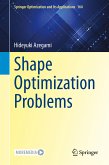The aim of this book is to provide basic knowledge of the inverse problems arising in various areas in mathematics, physics, engineering, and medical science. These practical problems boil down to the mathematical question in which one tries to recover the operator (coefficients) or the domain (manifolds) from spectral data. The characteristic properties of the operators in question are often reduced to those of Schrödinger operators. We start from the 1-dimensional theory to observe the main features of inverse spectral problems and then proceed to multi-dimensions. The first milestone is the Borg-Levinson theorem in the inverse Dirichlet problem in a bounded domain elucidating basic motivation of the inverse problem as well as the difference between 1-dimension and multi-dimension. The main theme is the inverse scattering, in which the spectral data is Heisenberg's S-matrix defined through the observation of the asymptotic behavior at infinity of solutions. Significant progress has been made in the past 30 years by using the Faddeev-Green function or the complex geometrical optics solution by Sylvester and Uhlmann, which made it possible to reconstruct the potential from the S-matrix of one fixed energy. One can also prove the equivalence of the knowledge of S-matrix and that of the Dirichlet-to-Neumann map for boundary value problems in bounded domains. We apply this idea also to the Dirac equation, the Maxwell equation, and discrete Schrödinger operators on perturbed lattices. Our final topic is the boundary control method introduced by Belishev and Kurylev, which is for the moment the only systematic method for the reconstruction of the Riemannian metric from the boundary observation, which we apply to the inverse scattering on non-compact manifolds. We stress that this book focuses on the lucid exposition of these problems and mathematical backgrounds by explaining the basic knowledge of functional analysis and spectral theory, omitting the technical details in order to make the book accessible to graduate students as an introduction to partial differential equations (PDEs) and functional analysis.
Dieser Download kann aus rechtlichen Gründen nur mit Rechnungsadresse in A, B, BG, CY, CZ, D, DK, EW, E, FIN, F, GR, HR, H, IRL, I, LT, L, LR, M, NL, PL, P, R, S, SLO, SK ausgeliefert werden.









